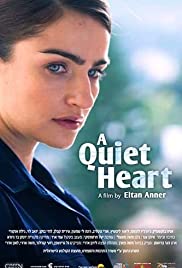
A QUIET HEART
Israel, 2016, 91 minutes, Colour.
Ania Buckstein, Uri Gottlieb, Giorgio Lupano.
Directed by Eitan Anner.
A Quiet Heart is a gentle film although it has many violent undertones. Music has a significant role throughout the film.
The film focuses on a young woman who has been something of a child prodigy, a pianist, but has lost competitions, been pressurised by her parents and given up on her musical career. She has moved from Tel Aviv to Jerusalem, doing work in cataloguing, renting some rooms in a very Orthodox area of the city.
The film highlights the antipathy of the Orthodox Jews towards non-religious Israelis as well as towards Catholics, especially in the form of Franciscan friars who have a community in the area. While the film shows pleasing vistas of Jerusalem, it also shows an ugly side. The young woman is non-religious, goes jogging and is attacked by men insulting her in the street. It appears that the previous occupant of the room killed herself, evidence accumulating that she had been persecuted because her interest in the Catholic Church. The neighbours are Orthodox but friendly, but the parking inspector is very hostile.
There is a piano in her room and one of the neighbour’s sons comes into play, gradually befriending the young woman and her coaching him and buying him sheet music. But he also witnessed the suicide of the previous occupant and finally confirms that it was the parking attendant.
The young woman is attracted by hearing the organ in the Franciscan friary, goes into the church, listens, befriends one of the brothers and has some organ lessons as well as playing. However, there is graffiti on her wall talking of her as a missionary, there are messages on her car, and her finding, as the piano is tuned, the range of documents hostile to the previous occupant. With a sympathetic fellow-student, she goes to the police, but the situation is too dangerous. When she visits the friary, the Superior urges her friend to keep his distance from her, fearing the prejudice of the Orthodox and its consequences.
The young woman begins to assert herself, defying the parking attendant by standing on the roof but not throwing herself down, going to the window of the neighbours and giving a gift of sheet music to the boy and the mother clasping her hand, a symbol of reconciliation.
While the director works in Israel, he was born in the United States.
1. The title, with reference to Naomi? Her experience in her family, with demanding parents? The music, performance, competitions and career? Moving from Tel Aviv to Jerusalem? Living amongst the Orthodox and its effect? The role of music, the little boy and his piano playing? Learning the organ, the friendship with Fabrizio?
2. Jerusalem settings, the district, the vistas of the buildings, the streets, the friary? The interiors, the apartments, the corridors? The workplaces and cataloguing? The church, the organ loft?
3. The role of music, in Naomi’s life? Her knowledge, her skills, giving up? The piano, the boy coming, stealthily, performance,-and other pieces? Naomi hearing the organ, having the lessons, performing? Playing with Fabrizio? Buying the sheet music for the boy, the gift?
4. Naomi as a person, her character, integrity? Loneliness, avoiding her parents, her mother’s phone calls and dominance, her father’s presence and wanting her to come home? Moving from Tel Aviv? Getting the apartment in Jerusalem, discussions with the landlord, the death of her predecessor and the unfolding mystery of her death, the persecution? The friendly neighbour, Orthodox, prayers and blessings, the children? Children playing downstairs? Her being hit on the head with the ball? The little boy, coming in the window, performance, mute? Her giving him the key, his mother at the end wanting him to give it back? Her guidance, encouraging his playing, the sheet music? The irony of his seeing the teacher fall to her death, his identifying the parking inspector?
5. Naomi and her neighbours, the landlord and the piano and its being moved? Her going to work, the security guard, the attraction, inviting her to a meal, his prejudices against the organ and her leaving? The parking inspector, rules and regulations, relentless, antipathy towards her? The fines, unable to pay, her mother’s car?
6. Hearing the organ, going into the church, sitting, fleeing? The return, the encounter with Fabrizio? His giving her the tour, the playing of the organ, her being unsettled? Continuing to return, the explanation of the range of the organ, her playing, Fabrizio getting her to improvise, creativity?
7. The antipathy towards her, her passing the men while she was jogging and their disdain and calling her names? The boys? The parking attendant on fines, the strictness? The messages and the graffiti, criticism of her going to the friary and her being a missionary? The effect on her?
8. The secular student, meeting her, her own injuries, the information, the phone number, her return visits, going to the police, the graffiti and the messages, the anonymous threats? Naomi’s fears, leaving the police? The student unable to do more?
9. The piano tuner, finding the message threats against the woman, taking them to the police?
10. Naomi going to the Friars, the Superior and his telling Fabrizio not to help? The fears and the prejudices against the Friars?
11. Naomi taking a stance, leaving a message about the commandment of not killing for the parking attendant? Her going higher on the parapet, his watching, her watching him?
Her going to the window, the neighbour and her help, the sheet music for the boy? His identifying the parking attendant at the time of the suicide? The complicity of the landlord? The family taking hold of Naomi – her future?